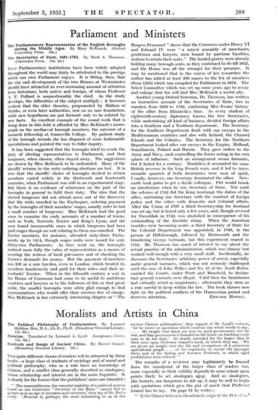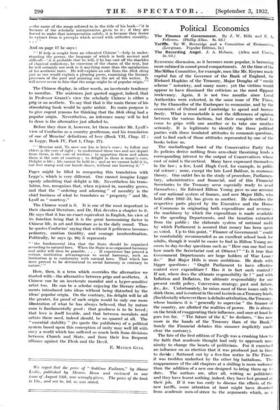Moralists and Artists in China
Festivals and Songs of Ancient China. By Marcel Granet. (Broadway Oriental Library. 18s.)
Two quite different classes of readers will be attracted lsy these books—a large class of students of sociology and of moral and political philosophy, who as a rule have no knowledge of Chinese, and a smaller class generally described as sinologues, whose scholarship and interest are in the main linguistic, It is clearly for the former that the publishers' notes are intended :
The reasonableness, the essential stability of a political system based on the Confucian " Doctrine of the Mean " cannot fail to 4.ttract us in an age of unreason and extremes,' they say of Dr. Hsi 's study. ' Mencius is, perhaps, the most interesting to us of the
ancient Chinese philosophers,' they suggest of Mr. Lyall's volume,
for he wrote on questions which confront the whole world to-day. . . . He taught that lands are won by good government, not by war, and that government is founded on the home, on teaching every man to do his duty.' As clearly intended for tho larger class is their note upon Professor Granet's book, in which they say, We are given an insight into the life and occupations of a primitive agricultural people . . . of the regulation of sexual life amongst them and of the Spring and Autumn Festivals, in which rigid prohibitions were relaxed.' " The remarks of a reviewer may legitimately be framed from the standpoint of the larger class of readers too, more especially as their validity depends to some extent upon points likely to set sinologues agog. And as sinologues, like hornets, are dangerous to stir up, it may be well to begin with quotations which give the gist of much that Professor Granet has to say. On page 81 he writes : • ' If the Chinese believe in the scholarly origin of the Sh ih china !
—the name of the songs referred to in the title of his book= it is because of the scholarly interpretation given to it ; if they are forced to make that interpretation subtle, it is because they desire to extract from it precepts which accord with orthodox morality.
And on page 17 he says :
" If help is sought from an educated Chinese '—help in under- standing the poems, the language of which is both ancient and difficult—' it is probable that he will, if he has cast off the shackles of classical orthodoxy, be conscious of the charm of the text, but he will certainly not seek in it anything more than the satisfaction of his aesthetic taste. He will explain an ode from the Shih ching just as one would explain a pleasing poem, examining the literary processes of the poet and pointing out the art of the writer. It will never occur to him that the songs might be of popular origin.' "
• - The Chinese display, in other words, an inveterate tendency
to moralize. The sentences just quoted suggest, indeed, that in Professor Granet's view the scholarly Chinese is either a prig or an aesthete. To say that that is the main theme of his stimulating book would be quite unfair. Its main purpose is to give cogent reasons for thinking that the Shih thing had a popular origin. Nevertheless, an inference many will be led to draw is the alternative just alluded to.
Before they draw it, however, let them consider Mr. Lyall's view of Confucius as a country gentleman, and his translation of one of Mencius' definitions of love (Book VII, Chap. 27 : in Legge, Book IV, Part 1, Chap. 27).
"'Mencius said, To save our kin is love's core ; to follow our elders is the core of right ; to understand these two and not depart from them, is the core of wisdom ; to apportion them and adorn them is the core of courtesy ; to delight in them is music's core. Delight is life ; life cannot be held in ; and as we cannot hold it in, our feet stamp and our hands dance, without our knowing it.' "
Pages might be filled in comparing this translation with Legge's, which is very different. One cannot imagine Legge openly admitting that delight is life. Nevertheless his trans- lation, too, recognizes that, when rejoiced in, morality grows, and that the " ordering and adorning " of morality is the chief business of what he translates as " propriety " and Mr. Lyall as " courtesy."
The Chinese word is li. It is one of the most important in their classical literature, and Dr. Hsil devotes a chapter to it.
He says that it has no exact equivalent in English, his view of its function being that it is the great harmonizing factor in Chinese life, in art and literature as in the daily round. Thus
he quotes Confucius' saying that without /i politeness becomes pedantry, caution timidity, and courage insubordination. Politically, he says (p. 96) li represents " ' the fundamental idea that the State should be organized according to natural laws. When the State is so organized harmony and order will then be possible.. . . If experience has proved a certain institution advantageous to social harmony, such an ,I.nstitution is in conformity with natural laws. That which has peen proved to be detrimental to social harmony is contrary to nature.' " Here, then, is a term which overrides the alternative we started with—the alternative between prigs and aesthetes. A Chinese can be an inveterate moralist and a hyper-sensitive artist too. He can be a scholar enjoying the literary refine- ments introduced into ideas without being disturbed by the ideas' popular origin. On the contrary, his delight will be-all the greater, for proof of such origin would be only one more illustration of what he has always believed, that by nature man is fundamentally good ; that goodness is to be loved ; that love is itself lovable, and that between moralists and artists there need, indeed should, be no quarrel at all. The
" essential stability" (to quote the publishers) of a political system based upon this conception of unity may well fill with envy a world which has suffered so much both from divisions between Church and State, and from their less frequent alliance against the Flesh and the Devil.
E. MAsico GULL































 Previous page
Previous page